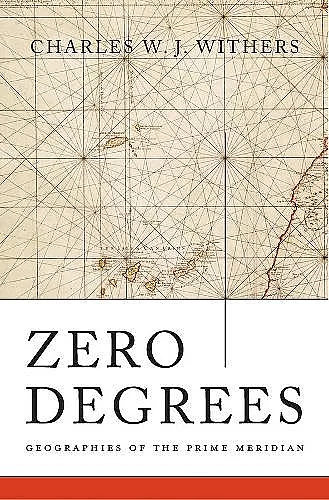Zero Degrees
Geographies of the Prime Meridian
Format:Hardback
Publisher:Harvard University Press
Published:13th Mar '17
Currently unavailable, and unfortunately no date known when it will be back

Space and time on earth are regulated by the prime meridian, 0°, which is, by convention, based at the Royal Observatory, Greenwich. But the meridian’s location in southeast London is not a simple legacy of Britain’s imperial past. Before the nineteenth century, more than twenty-five different prime meridians were in use around the world, including Paris, Beijing, Greenwich, Washington, and the location traditional in Europe since Ptolemy, the Canary Islands. Charles Withers explains how the choice of Greenwich to mark 0° longitude solved complex problems of global measurement that had engaged geographers, astronomers, and mariners since ancient times.
Withers guides readers through the navigation and astronomy associated with diverse meridians and explains the problems that these cartographic lines both solved and created. He shows that as science and commerce became more global and as railway and telegraph networks tied the world closer together, the multiplicity of prime meridians led to ever greater confusion in the coordination of time and the geographical division of space. After a series of international scientific meetings, notably the 1884 International Meridian Conference in Washington, DC, Greenwich emerged as the most pragmatic choice for a global prime meridian, though not unanimously or without acrimony. Even after 1884, other prime meridians remained in use for decades.
As Zero Degrees shows, geographies of the prime meridian are a testament to the power of maps, the challenges of accurate measurement on a global scale, and the role of scientific authority in creating the modern world.
[A] wonderful new book on the long and uneven history of the Prime Meridian…The book is deeply and impeccably researched, and immensely detailed, but it is always a fascinating and compelling read…It is hard to imagine a better, fuller or more coherent account of how modern time came to be. -- Penny Fielding * Journal of British Studies *
[A] compelling book…Withers manages to turn what might have been an obscure, rather technical topic into a fascinating account of international rivalry and a meditation on what the whole business of measuring the world around us can reveal about broader
cultural patterns.
An extremely well researched book that ties together various disciplines and fills in details absent from previous single works on the subject…[Zero Degrees] will serve libraries, scholars, and researchers well for a longtime to come. -- Ian Fowler * Journal of Historical Geography *
This is a delightful and thoughtful book…As an artifact, it is also beautifully produced by its publisher. -- Richard Sorrenson * Bulletin of the Pacific Circle *
Charles Withers raises fundamental questions about themes of great contemporary relevance: the ways in which competing local and national interests can ever be reconciled around themes of urgent technological and political concern, and the very question of what counts as global action and globalised authority. Not at all a simple tale of rational planning and of reasoned debate, the stories told here emerge in startling detail as more complex, more fascinating and more consequential than has ever previously been recognised. This is a story of compromise and cunning, of improvisation and partisanship, bringing the highest standards of geographical and historical scholarship to bear on the fundamental problem of the meridian. -- Simon Schaffer, University of Cambridge
This is a rich and valuable book about an important narrative in the history of science and geography, one that presents a longer and deeper historical context for the choice of Greenwich than any other accounts. -- Richard Dunn, Senior Curator and Head of Science and Technology, National Maritime Museum, Greenwich
- Winner of John Lyman Book Award 2017
ISBN: 9780674088818
Dimensions: unknown
Weight: unknown
336 pages